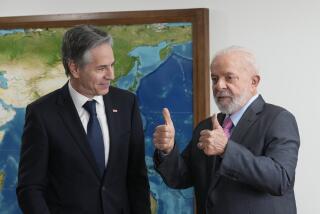Brazil Reforms Key to Region, U.S. Official Says
- Share via
BUENOS AIRES — With a moment of truth approaching for Latin America, Brazil must follow through on fiscal reforms to protect the health of interconnected economies throughout the hemisphere, a high-ranking U.S. trade official told business leaders Monday.
Deputy U.S. Trade Representative Anthony Fisher rejected fears that economic turmoil in Latin America, whose embrace of free markets has not warded off repercussions of the global crisis, will delay a direly needed “second wave” of reforms of the justice and social welfare systems.
During a visit to Argentina, Brazil and Chile, Fisher acknowledged that President Fernando Henrique Cardoso of Brazil faces a formidable task after his apparent reelection Sunday. Vote counts Monday in the presidential election showed Cardoso narrowly avoiding a runoff.
“What the Brazilian government and particularly this [president] have laid out is very impressive,” Fisher said after a speech at Argentina’s Central Bank. “The proof will be in the pudding. . . . This is a very important watershed period in Brazilian history.”
Investors are eager for Cardoso to reveal details of how he will cut a $66-billion budget deficit and restructure wasteful tax, civil service and social security systems. Cardoso’s announcement is a necessary prelude to a bailout package being negotiated by Brazilian and international finance officials in Washington. The bailout reportedly totals between $25 billion and $30 billion.
Even if the combination of international aid and domestic austerity measures prevents a collapse of the economy, Brazilians are braced for a harsh 1999.
In a somber editorial Monday, one of Brazil’s major newspapers, the Folha de Sao Paulo, warned that Cardoso will not enjoy “the margin for maneuver or the time that he had during his first mandate. . . . Despite his impressive victory, a period of political uncertainty has begun. Let us hope there will be consensus with respect to the gravity of the moment and commitment to the tough, but now inevitable, measures of state austerity.”
Underscoring the urgency of the moment, analysts say Cardoso is likely to postpone otherwise customary changes in his Cabinet to concentrate on fiscal issues. The call for quick action, however, may be offset by pending runoffs later this month in gubernatorial races in key states such as Rio de Janeiro and Sao Paulo, where talk of tax increases and other drastic measures could hurt candidates of Cardoso’s governing coalition.
With 40% of the region’s gross domestic product, Brazil is Latin America’s biggest economic domino. Neighbors in the so-called southern cone are watching developments anxiously. Argentina, for example, has quintupled exports to Brazil since 1990 and would suffer from a worsening Brazilian economy.
Yet Argentina, Chile and Brazil are models of the free-market transformation espoused by U.S. policymakers and do not deserve the label “emerging nations,” Fisher asserted. He criticized investors for treating the region as skittishly as they have treated Russia in recent months.
“Russia does not fit in the same category as Argentina, Brazil and Chile,” he said.
If Brazil succeeds in turning around the grim numbers, Fisher predicted a “huge flow of direct investment. The whole region will be the beneficiary.”
The regional focus on macro-economic survival has replaced talk about urgent social problems. The promises by the hemisphere’s presidents at their summit in April to crack down on crime and corruption, overhaul schools and combat profound inequality seem especially fanciful in today’s environment.
Cardoso and his advisors in Brazil hope to return to the social agenda if the economy improves during the next two years, according to political commentator and columnist Helena Chagas in Brasilia. But she added that Cardoso’s reelection has started the clock on “a game of all or nothing.”
More to Read
Sign up for Essential California
The most important California stories and recommendations in your inbox every morning.
You may occasionally receive promotional content from the Los Angeles Times.













